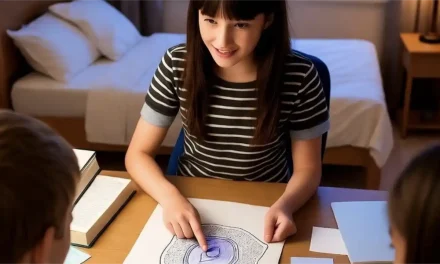
Integrating Philosophy into Daily Life: Reinforcing Purpose Through Rituals
E
ach week, artists in the cafés of Paris followed quiet rituals—morning sketches, evening debates, pages filled in worn notebooks. Their routines gave shape to their dreams, turning scattered ideas into real progress. Kids need that kind of structure too. Without it, school, screens, and daily noise pull their attention in every direction. But purpose doesn’t arrive on its own—it grows from habits. Try asking your child, “What’s our goal this week?” It’s a simple prompt, but it helps transform the blur of activity into something grounded and intentional.
One foggy Sunday, my son flopped on the couch, chores undone, his mind adrift. I gathered the family and asked what each of us wanted to focus on that week. He paused, then said, “Finish my book.” We lit a lamp and planned reading nights. Page by page, he followed through. He was proud—not just of finishing, but of having chosen something that mattered. That one habit took root. Now he sets goals more easily—for school, for hobbies, for himself. He’s learning that purpose isn’t a single moment. It’s a rhythm.
Build simple rituals around intention. At the start of each week—over breakfast, on a walk, or around the table—ask what they’d like to aim for. For younger kids, it might be light: build a tower, try a recipe. For teens, let the goal reflect their passion. Write it down or talk it through. Then revisit it gently during the week. You’re not tracking success—you’re building a habit of movement with meaning. That rhythm, repeated often, becomes something steady to steer by.
Integrating Philosophy into Daily Life

Integrating Philosophy into Daily Life: Sharing Reflections as a Family
Family reflection deepens understanding and connection. Create calm spaces to talk, listen, and grow together with empathy.

Integrating Philosophy into Daily Life: Weaving Reason into Routines
Daily routines can teach clarity and thoughtful action. Encourage children to pause, reflect, and use reason in everyday decisions.
Table of contents

Primordial Soup for the Mind: Navigation
Navigate the book Primordial Soup for the Mind.
TIPS
- Spark shared goals, not rigid rules
- Celebrate direction, not just achievement
- Let them revise or reset without guilt
ACTIVITIES
- Goal Set: Ask “What’s our goal this week?” and create a shared ritual
- Midweek Check: Ask “How is it going?” and adjust together
- Finish Cheer: At week’s end, reflect on what moved forward—even a little
TOOLS
Whiteboard, paper tracker, or a shared note (optional)

Download “Primordial Soup for the Mind: A Parent’s Guide to Nurturing Intellectual Growth”
Enter your information to get this article and hundreds more as part of the FREE book Primordial Soup for the Mind.
Share your thoughts with the Thought Academy community in the Comments section below.

Sharpen those skills!
Enter your information to get our FREE practice exercises so you can hone your critical thinking and reasoning skills!







0 Comments